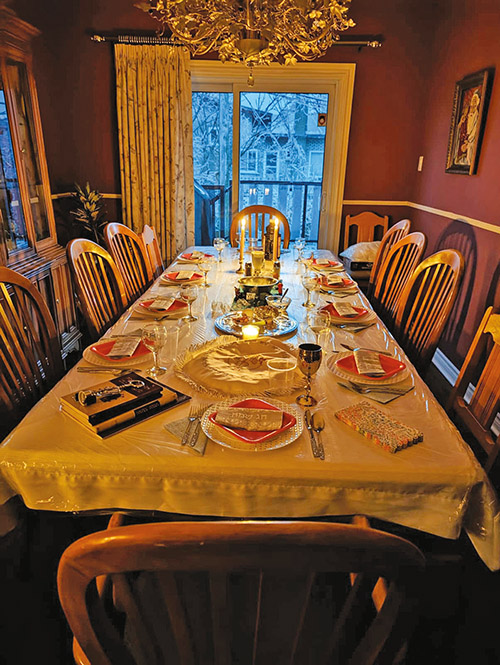
Candlelight dinners generally reserved for a special occasion became the norm for thousands of Montrealers as just a few hours before the onset of Pesach community after community began to experience power failures. Hydro Quebec (the equivalent of our PSE&G) announced that 1.1 million customers lost power due to an unexpected ice storm. Trees were down, roads were impassable and the sidewalks became a threat to many as they had to slide along and pray that their bodies stayed upright.
How does one heat up their food, keep their bodies warm and maneuver in their homes in total darkness? From everyone who I spoke with it was not an easy task, especially since so many had out of town guests visiting for the holiday.
Rabbi Saul Emanuel, executive director of the Jewish Community Council of Montreal (MK Kosher), discussed the seriousness of the situation with me, in that many families who are food deprived and given food on a regular basis donated by the community with special provisions for Pesach needed to dispose of their supplies due to spoilage. The community has begun a campaign sanctioned by every rav in the Chassidic and non Chassidic world.
Rav Yonasan Binyomin Weiss, chief rabbi of the Beth Din of Montreal, was quoted as saying, “Helping those in need especially at this time is a tremendous mitzvah.” Chuckling briefly over this awful situation, Rabbi Emanuel mentioned that for whatever reason he and one neighbor had power throughout, and he at first assumed that he was the only one in his neighborhood who had paid his bills on time.
We all have candles in our homes but exactly how many can we possibly have in order to maintain some semblance of anything after one or two or three days. As soon as the power went out, several hours before the chag began, everyone was scrambling to buy more candles. Apparently Ikea is a store that has many candles in different varieties and lengths of burning.
Prior to the chag beginning there was not a candle to be had.
One friend who sent me a picture of the glistening trees behind her home sparkling into her dining room where her table looked regal covered with tea lights offered that it was all very special for the first little while, however when the realization sunk in that this was not going to be a temporary problem and Yom Tov went into Shabbat the festive feel turned into desperation.
The consensus of everyone who I spoke with was that cold chicken soup is not very pleasant to digest.
Different “eitzas” or ideas of how to deal with this lunacy were shared from neighbor to neighbor. One friend ran and bought cans of sterno. She filled a very large aluminum foil pan and kept it in her oven with the sterno below it. All night, she said, she ran down to keep replacing the sterno in order to be able to warm her food the next day. She did say that her plan was successful and that her food was pleasantly warm and even hot. Another friend shared her seder with her neighbor thinking that the more bodies in the house the warmer it would be.
Due to the extreme cold, below freezing for most of the days, everyone was concerned about each other. One family actually thought that their new baby was beginning to turn blue and the elderly left alone in their apartments without any means of leaving due to lack of elevator usage were constantly on the minds of many.
Ingenuity kicked in as strollers became means of transporting food to the few homes that were left with power and turns were taken warming the food. If for no other reason an ice storm does succeed in bringing neighbors together who had never spoken to each other before. Kindness shone through as each one was trying their best to keep their neighbors and family from despair.
Preparation for Pesach is no small feat, especially when families are gathering together from near and far, and as one very sad friend mentioned, many “visiting” children couldn’t wait to leave with whatever food that was salvaged being packaged up and taken in their cars back to the warm confines of the United States for chol hamoed and the last days of Pesach. The last thought on their minds was not that they would have to scurry to get Pesach food upon arriving home. These frozen refugees wanted out as quickly as possible, much to their sadness as well as the sadness of their families who had so anxiously awaited their arrival!
By Nina Glick









